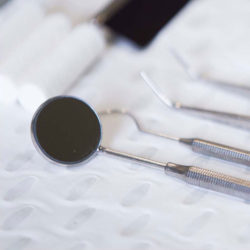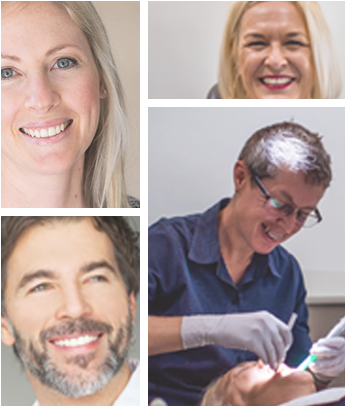Root Canal Fillings Dentist Kenmore

Root Canal tHERAPY
The concerns around root canal have been researched and documented over the years but it remains a grey area. It is thought that some root canal filling materials can break down into chemicals that can cause negative reactions or may even be potentially toxic to the body for example. However, that said, at Evolve Dental Healing, after much reading, researching, and soul searching, we continue to provide root fillings (sometimes with a specialist) in cases which we feel to be appropriate.
The type of root canal treatment and root filling used at our Kenmore dentist practice is loosely termed biological root filling as the technique and materials used are more in line with the biochemistry of the body and are therefore less likely to cause unwanted side effects.
Each tooth is assessed on its own merit taking into account its history, degree of remaining tooth structure, the complexity of root configuration, and most importantly the health and the treatment wishes of the patient.
A root canal filling allows you to keep a tooth that would otherwise have to be extracted.
If you get severe pain, a dental abscess, a toothache, or need emergency dental care then a root canal treatment and root filling can address your pain, make the tooth comfortable again and save you from losing a tooth.
Dr Rachel Hall, Kenmore Dentist, is a dental expert with 30 years experience. She has extensive experience in providing holistic dentistry, safe amalgam removal, and cosmetic dental services.
We offer state of the art technology and dentistry with a difference where your total health is as important as your smile.
CALL TO BOOK YOUR CONSULTATION TODAY 07 3720 1811


Dr Rachel Hall

Find Out Why Our Patients Are Smiling

Get involved with a fully personalised approach to your dental care.

Free onsite parking in peaceful tree lined suburban location.

Finance that works for you.
Claim your health fund on the spot.
Easy finance plan application.
A root canal is a dental treatment used to save a tooth with an infected or dead pulp (the nerve and blood vessels in the centre of the tooth are called the pulp). A. root canal is done to relieve pain, remove infection, and prevent the infection from spreading. A root canal saves the affected tooth by cleaning out the diseased pulp and placing a filling inside the root canal.
Pulp exists inside each tooth, providing the tooth with nerves and nutrients. The pulp tissue can sometimes die if it is damaged or diseased. Once the nerve and pulp are removed, the root canal is cleaned and sealed for protection. A crown is then placed over the tooth to increase its strength.
In the past, teeth with damaged pulps were removed. Today, root canal treatment has provided dentists with a safe solution for saving the tooth and maintaining your natural smile.
The cost of root canal therapy will depend on several factors, including how many canals need to be filled and if you require a crown. A front tooth tends to have one canal, whereas a back molar tooth can have 3 or 4 canals. The cost of a root canal is based on how many canals the tooth has and how many visits it takes for the infection to resolve. The average cost of a root canal on a back molar tooth is around $2,000.
It’s quite common to ask, “Is it necessary to get root canal treatment?” Or, “What would happen if you leave a root canal untreated?” Your tooth cannot heal by itself. If left untreated, the infection could lead to:
- An abscess forming at the root of the tooth
- Deterioration of the underlying bone tissue
- Severe pain
Delaying treatment for too long can make it impossible for your dentist to save your tooth
The infection can also spread to neighbouring teeth, potentially leading to:
- Illness
- Blood poisoning
- Fevers
- Swelling of the face and neck
A root canal is usually a simple procedure with little or no discomfort. It involves one to three visits to a dentist.
Here is a step-by-step guide to how the procedure saves your tooth:
Your dentist makes an opening through the top of the tooth down to the pulp chamber.
The injured or dead pulp is taken out and the root canals are irrigated and medicated.
A temporary filling is placed in the opening at the top of the tooth in order to protect it between procedures. Alternatively, the tooth may be left open to drain for a couple of days.
The temporary filling gets removed and the pulp chamber and root canal(s) are cleaned then filled.
A crown is placed over the tooth to preventing from breaking or splitting.
Most patients report that having a root canal treatment today is as easy as getting a filling.
It’s important to visit a dentist that provides a high-quality and reliable solution for your dental treatment. Poorly trained dentists may miss a canal that is causing you problems or a crack in the root of your tooth. This leaves you exposed to the reintroduction of bacteria in that area and can result in the need for a repeated root canal. Dr Rachel Hall of Evolve dentist Kenmore has undergone additional postgraduate training in root canal therapy.
Generally, health insurance extras in Australia do not cover root canal therapy unless you have major dental cover. To have root canal therapy covered, you will need to have a high level of extras cover. Most extras cover policies include general dental treatments like check-ups, but do not include major dental procedures, like root canal treatments.
At Evolve Dental Healing Kenmore we provide payment plan options to support you with the cost of your dental care.
An Endodontist is a specialist in root canal treatment; however, all dentists are capable of performing this treatment. Your Evolve Kenmore dentist can assist you with a root canal, and only patients with rare and special circumstances are referred to a specialist.
If you need a root canal treatment, you will probably experience the symptoms of pulp tissue damage. Individuals may experience symptoms differently, but these are the most common symptoms of an injured or damaged pulp:
- Pain when biting down and chewing
- Oversensitivity of teeth with hot or cold food or beverages
- Facial swelling
These symptoms can also be a sign of other oral health issues, so they may not always indicate that you require root canal treatment. It is recommended that you consult your Kenmore root canal dentist if you are experiencing pain or discomfort.
Book an emergency dental appointment today 07 3720 1811
Root canals usually involve 1-3 visits to the dentist, and the process usually takes 30-90 minutes. The procedure typically takes longer than a standard filling due to the technical nature of the process.
The recovery period after root canal treatment is minimal, and you should be feeling completely back to normal after just a few days. Slight inflammation is normal and may cause discomfort for a couple of days or so. This can be treated with an over-the-counter painkiller, as well as a warm saltwater rinse.
The root canal treatment eliminates the pain caused by the tooth infection. A local anaesthetic numbs the tooth and surrounding area, making the root canal procedure painless.
Many patients want to know what is the success rate of a root canal. Root canals generally have a success rate ranging from 85% to over 95%. Root canal therapy generally fails because of the presence of bacteria. There are five common reasons why root canal treatment fails, but luckily, they are preventable. Root canals often fail due to:
- Missed canals
- Unfinished treatment of canals
- Leftover infected tissue
- Fracture
- Bacterial leakage after treatment
The best way to prevent root canal failure is to visit an experienced dentist that has the proper equipment and training like Dr Rachel Hall Kenmore Dentist who is able to perform more complex or specialised root canal endodontic treatments.
There are several indications of a failed root canal treatment, including:
- Severe lingering tooth pain that worsens with additional pressure on the tooth
- Unfinished treatment of canals
- Facial swelling or swelling surrounding the affected area
- Small bumps on the gum
- Darkening of the tooth
- Discharge from the area surrounding the affected tooth
Root canal therapy stops the infection from spreading and alleviates the pain caused by the infected tooth pulp. If left untreated, bacteria from the infection can travel via the roots of the tooth directly to the tissues surrounding the area – typically the gums and jaw. This can result in a painful abscess to occur. In rare cases, inflammation of the whole body can occur, which increases the risk of dangerous conditions like heart disease or a brain abscess. If you leave a root canal untreated, you can also lose the tooth. Losing a tooth can lead to an increased risk of other problems, such as gum disease, further tooth loss, and decay. If left untreated, the natural tooth continues to decay and will only deteriorate further.
Call to book a consultation 073720 1811
An untreated infection in your tooth is a ticking time bomb. The infection can spread from the roots of the tooth to vulnerable tissues in the body. To combat this, your dentist may prescribe antibiotics. It is necessary to get a root canal to stop the infection from worsening and prevent tooth loss.
After root canal therapy, it is also necessary to ensure the tooth is filled and sealed. This protects the tooth after the dead tissue has been removed. After treatment, the tooth will be brittle and more prone to fracturing, so a crown is necessary to preserve the structural integrity of the tooth.
Root canal treatment is a simple and painless procedure that offers many benefits, including:
- Relief of pain and discomfort
- Prevention of spread of infection
- A healthy restored tooth that can last a lifetime
- No interruption or changes to other teeth
- Normal biting and chewing sensation
- You get to keep your natural smile!
Returned infection is a possibility, although it is an uncommon side effect of root canal treatment. This can be the result of incorrectly cleaned root canals or an undetected crack in the root of a tooth. Returned infection can be aided with a simple retreatment. If you’re concerned about the side effects of root canal treatment, you should seek advice from your Kenmore dentist.
On average, over 95% of root canal treatments are completed successfully. Occasionally, a case may require a repeat treatment if there are diseased canal offshoots that have initially gone undetected, or if the canal filing instrument fractures, but this is very rare. Returning pain is a symptom of a root canal that has not been completed correctly. If you’re concerned about the risks of root canal treatment you should seek advice from your dentist.
The only alternative is to have the tooth extracted. Unfortunately, this can affect the surrounding teeth, often causing them to move and leaving you with a bad bite. Although having your tooth pulled out may cost less initially, the space left will likely require an implant or bridge to be fitted, which can ultimately be more expensive than root canal treatment. If you have the choice, keeping your original teeth is always the best option.
Ibuprofen and other anti-inflammatory medicines may help to reduce inflammation when taken pre-operatively. Seek advice from your dentist and follow the recommended dosage.
After your root canal treatment it’s best to wait until the numbness in your mouth wears off before eating to avoid biting your cheek or tongue. To avoid damaging the treated tooth, try not to chew or bite down on the treated tooth until it is fully restored by your Kenmore dentist.
It’s always best to seek advice from your Kenmore dentist, but soft, cold foods are generally recommended. Soft, cold foods include fruits like bananas, mangos, pears, peaches and fruit smoothies, yoghurt, soup and eggs.
Unless your dentist advises otherwise, it’s generally best to stay away from hard, crunchy, or chewy foods as this may damage your treated tooth or cause pain. Spicy or hot food may increase sensitivity in the treated tooth, and consuming alcohol may cause bleeding in the surrounding area. Eating on the opposite side of the area treated may also help to avoid discomfort.
Drinking hot coffee immediately after a root canal treatment may increase sensitivity and cause discomfort in the treated tooth, so it’s best to avoid hot coffee until the numbness in your mouth wears off. If you drink fluids immediately after your treatment it’s best to avoid hot coffee at least until the feeling in your mouth has returned.
After a root canal treatment, the anaesthetic will wear off and you may experience a throbbing pain, which may last a day or two. Antibiotics and other pain medicines like ibuprofen can assist. Antibiotics can also help to suppress the painful symptoms of nerve damage. Your dentist can recommend an antibiotic to assist you after your root canal treatment.
If you have not had trouble driving in the past after seeing the dentist for a filling, then there is no reason you should have a problem driving after a root canal procedure. Most likely you will be numb for an hour or two after your appointment just like most filling procedures.
You may brush and floss the treated tooth gently but should not floss if a temporary filling was placed in the space between teeth.
Our Practice
CONTACT US
67 Kenmore Road
Kenmore Queensland 4069
Phone: 07 3720 1811
Fax: 07 3720 1899
Email: info@evolvedental.com.au
OPENING HOURS
Monday – Friday: 7:30am – 5:30pm
References and Citations Mercury & Amalgam Fillings




